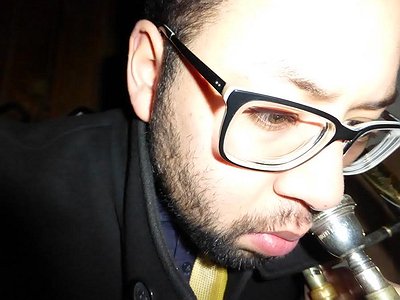Part 2
Purportedly, John Stevens of the Spontaneous Music Ensemble had two basic rules to playing in his ensemble: (1) If you can't hear another musician, you're playing too loud, and (2) if the music you're producing doesn't regularly relate to what you're hearing others create, why be in the group. What's your perspective on this statement and how, more generally, does playing in a group compare to a solo situation?
I agree with the notion that one must listen to others in a group but only insofar as the intention is to convey a group sound. Clearly musicians in a space influence the acoustic and therefore the sound within it, so auditory awareness isn’t always that important for group playing. The only difference between group and solo playing is the metaphysical energy within the space.
With more and more musicians creating than ever and more, what does this mean for you as an artist in terms of originality? What are some of the areas where you currently see the greatest potential for originality and who are some of the artists and communities that you find inspiring in this regard?
Every artist and musician has their own unique voice because the characteristics of their lives are all totally different. The processes inherent in each artists work differ enormously so no two artists are ever the same. All artwork is therefore completely original.
What constitutes a good live performance in your opinion and what’s your approach to performing on stage? How do an improvisation and the recording of this improvisation compare?
There is no such thing as a good live performance because it depends on the context, space and audience perception. I do however, feel that recordings are most genuine because they reflect the biased musical voice of the performer. An audience can disrupt this natural equilibrium.
Listening is also an active, rather than just a passive process. How do you see the role of the listener in the musical communication process?
The listener has a role to play but the listener's role is not as important as the message the performer is trying to communicate. Ultimately, the performer has a message to convey, the listener should be receptive to that message.
How do you see the relationship between music and other forms of art – painting, video art and cinema most importantly - and in how far, do you feel, does music relate to other senses than hearing alone?
Music relates to every other form of art in some way and also relates to every conceivable discipline in many ways. Music is part of the world and a major part of people’s lives whether they like it or not.
Reaching audiences usually involves reaching out to the press and possibly working with a PR company. What's your perspective on the promo system? In which way do music journalism and PR companies change the way music is perceived by the public?
PR and corporate interest promote certain types of commercial music and genres which generate maximum profit. The public are sometimes unaware of the fact that music is pushed at them and this needs to change. Ultimately, people need to be exposed to a wide variety of musical styles and genres and must be offered different musical experiences continually.
Do you have a musical vision that you haven't been able to realise for technical or financial reasons – or an idea of what music itself could be beyond its current form?
Music is what is available to the performer as a means of expression. The musician dictates the message and uses what he / she has at the time to convey that message. There are no limits to the way in which music can be conveyed and I am always searching for new ways of exploring musical communication.
Visit Kris's website httpkrisreeder.weebly.com





